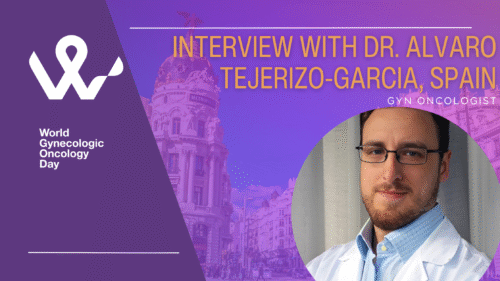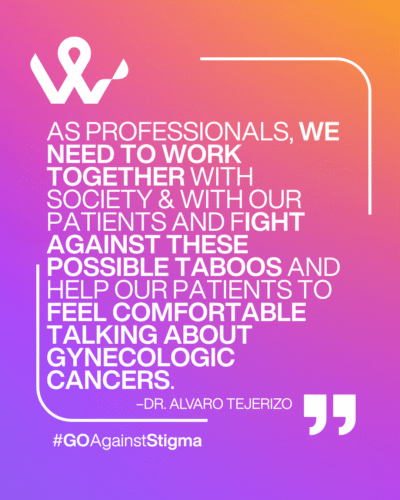
We were very pleased to chat with ESGO Council Member Dr. Alvaro Tejerizo Garcia over Instagram Live! A gyn oncologist in Madrid, Dr. Tejerizo-Garcia told us about the importance of early detection in gynecologic cancers and emphasized that reducing stigma about these cancers and about gynecologic issues in general only helps!
[Note: Dr Tejerizo is the newest member of the World Gynecologic Oncology Day working group! Check out the blog post he also wrote for you this month on gyn cancer symptoms!]
Alvaro Tejerizo-Garcia
It's an honor for me to be here with you, Beth, and all the friends of World Gynecologic Oncology Day.
My name is Alvaro Tejerizo. I'm from Spain, from a small but I think very beautiful city called Salamanca, which is very famous for its university. I'm a gynecologist.
I've dedicated more or less 20 years to gynecologic cancer.
Now I'm an assistant professor at the Universidad Complutense de Madrid. And for the past eight years, I've been the head of the gynecology oncology unit in Hospital 12 de Octubre de Madrid, with an amazing team, I have to say. And my hospital is one of the largest hospitals in Spain and even in Europe.
It’s a general hospital with all the specialties, but I think it's a leader in oncology. And finally, I'm now a council member of the European Society of Gynecology Oncology. And that's why I'm here with you, trying to get visibility for this kind of tumor and the experience of our patients.
World Gynecologic Oncology Day
Thank you so much! Just to reiterate, World Gynecologic Oncology Day is a project of ENGAGe, which is the European Network of Gynecological Cancer Advocacy Groups. And ENGAGe is itself a network of the European Society of Gynecologic Oncology.
So we are a big ESGO family here! And we're very happy to have you. Dr. Alvaro, what are some of the most pressing concerns for gynecological cancer patients in Spain right now?
Alvaro Tejerizo-Garcia
Well, I think all the patients diagnosed with cancer share more or less the same concerns, no matter where they live.
But it's mainly the fear of the unknown, not knowing what's going to happen and how it's going to happen. And above all, the fear of suffering. In Spain, we are fortunate to have a universal healthcare system.
So our patients don't have to worry about the financial cost of cancer. You know, it could be very, very expensive, and that's a big relief. But if I have to focus one problem, and the main challenge we're still facing is the lack of universal centralization for oncology patients.
It's a very good health system, but not focused on the centralization of this kind of patients, especially for complex cases like advanced ovarian cancer or cancer relapses. So even though our healthcare system is considered one of the world's biggest or the best of the world, I believe we have to improve this. Because we know that these patients have the best outcomes when they are treated by multidisciplinary teams and high-volume centers with access to clinical trials.
So we need to raise awareness, not only among doctors and patients, but also among policymakers. We need to convince our policymakers that this is something necessary, because our patients deserve the best treatment that we could give to them.
This is, I think, the most important thing that we have to try to fight nowadays in our specialty.
World Gynecologic Oncology Day
Could you explain what you mean by “centralized care”?
Alvaro Tejerizo-Garcia
In Spain, I can give you an example. Here in Madrid, we have 27 hospitals in the healthcare system.
So any one of them could diagnose and treat any kind of cancer. So maybe the easiest cases could be that way.
But if you centralize the complex cases, we know that the treatment could be better, because you have a big team specializing in that kind of tumors.
And then the treatment is going to be very personalized to that woman. It's very important for this kind of tumors and patients. And it requires a lot of institutional cooperation.
We can minimize the time from the diagnosis to treatment. It's very important.
World Gynecologic Oncology Day
As we keep reiterating in our online campaigns, early detection saves lives, right?
Alvaro Tejerizo-Garcia
The earlier it's treated, the better. That's the key.
World Gynecologic Oncology Day
Which brings us, I think, to the topic of stigma, which is one of the reasons some women don't come for diagnosis—because they feel afraid, they feel maybe that they are going to be judged.
What do you think the situation is in Spain with stigma, societal stigma, surrounding gynecological cancers?

Alvaro Tejerizo-Garcia
We have to face that even though times are changing, there's still a certain level of stigma or even taboo around gynecologic cancer.
That's why World Gynecologic Oncology Day is very important for us.
I think that we have mainly three things: The first one is that maybe some surgeries in gynecologic cancer can be quite mutilating.
This could have a big impact on our women, how they see themselves and how they think. This directly affects their quality of life. It's very important emotionally, psychologically, and in the sexual sphere.
This is an area that we are, my team, we are focusing on right now, and with some very interesting clinical trials, trying to improve the quality of life of our patients.
The second one is: I think that some gynecologic cancers, for example, cervical cancer, are linked to a very private aspect of women’s lives. I mean, this kind of cancer is strongly related with the HPV and sexuality, and maybe our patients think that we are going to have a problem with that.
We have to help these patients get out from these worries.
And the third one, I often see patients blaming themselves for not going to regular checkups.
And of course, screening and HPV vaccination are essential, but even when women attend regular checkups, these cancers can still appear. So there is no reason to feel guilty.
I think as professionals, we need to work together with society and with our patients and fight against these possible taboos and help our patients to feel comfortable talking about this.
World Gynecologic Oncology Day
Absolutely. And maybe we should just say it directly here—when you get a patient who comes to you and they say, ‘oh no, I'm bleeding a lot and I'm worried about these symptoms,’ do you judge her?
Alvaro Tejerizo-Garcia
No, of course not.
No, no, no. That's the key. First of all, they have to think that this is not their fault.
There’s nothing wrong that they have done. We need to help them to let go of any self-blame because this illness is not something they caused. So no, no judgment.
World Gynecologic Oncology Day
And what do you say if a patient came to you and said, ‘I'm experiencing some stigma. Maybe my family isn't talking to me about this or they think that I did something wrong.’ What advice would you give them?
Alvaro Tejerizo-Garcia
I would say that they have to stop blaming themselves.
We have a very big working team in my hospital with psych oncologists. They give them some tools to face these kinds of cancers. And of course, trying to say to them that we try to speak with the family and we try to make a comfortable circle of this because the treatment could take a long time, maybe six months or something like this.
And we have to work with not only the patient, but also with the family, trying to understand what is going on and what is going to happen in the future. So with this, I think, with information, we can fight against stigma and this taboo.
World Gynecologic Oncology Day
We have a question now in the comments from Dr. Nagham Ibrahim, who is a gynecologist in Iraq.
She asks: “How can we release the stigma of HPV infection in women, social, and marital life?” Do you have any thoughts on that?
Alvaro Tejerizo-Garcia
I think the information is the key. Our patients and the society need to know that every single woman—we know that 80 and 90% of our patients or the society—is going to have contact with HPV. So it's very prevalent.
There must not be a stigma with this. Every single one of us must have contact with HPV.
Information is the key. We have to make social awareness and maybe through social media, talking about this and that HPV is very prevalent. So there's no relationship with any kind of bad behaviors or things like this.
Talking about it more, listening to other people discuss their experiences, all of this, I think can help erase the stigma. Very important to share the experience of our patients with other ones.
World Gynecologic Oncology Day
That leads me to another question, which is about the patient advocacy group that's very big in Spain, which is Asociación ASACO. You have been active with them, is that right?
Alvaro Tejerizo-Garcia
ASACO with Charo Hierro. I want to take this opportunity to send her my greetings!
They work very hard every single day and every year on World Gynecologic Oncology Day.
This year, we are trying to plan something a bit different, like a meeting in our hospital. We'll bring professionals and patients together to share experiences and talk openly about gynecologic cancer and focus on this problem of the stigma.
World Gynecologic Oncology Day
That's fantastic! Check back in September to learn more about that event.
What would you say to someone who is thinking about getting involved, Dr. Alvaro, but maybe hasn't had any experience with awareness events. What would you say to them if they want to get started?
Alvaro Tejerizo-Garcia
Just don't hesitate.
Just join. Because one, as a doctor, one of the best things that we can do is to stand beside our patients and give them the voice. When they share their experience, we learn a lot from them. Help them to share their experience with all other patients and go through this journey.
I think that when the patient then shares or sees what happened with another patient, it's easier for them to go through this journey with less fear and more confidence. So it's very, very important to give our patients the voice.
And I think in medical practice, things are changing. One of our friends, Santiago Domingo, always says that in all the medical congress have to take place to our patients to learn about them and what they have to say to us to change in our daily practice. So join us.
Don't hesitate.
World Gynecologic Oncology Day
So Dr. Alvaro, anything else you want to say? Any final message about gynecological cancers or getting involved?
Alvaro Tejerizo-Garcia
Please join us. Be a part of World Gynecologic Oncology Day. It's very important for us and our patients.



